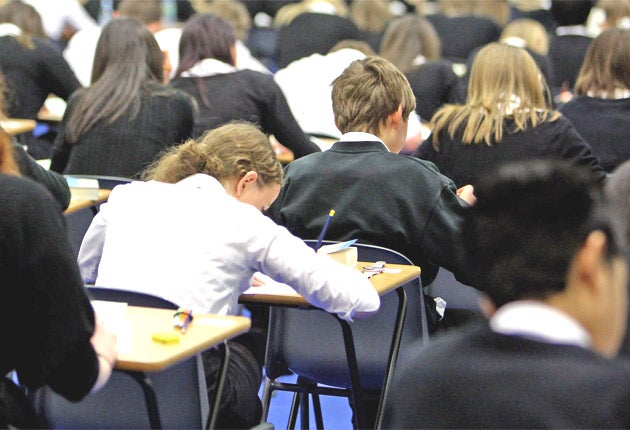'GCSEs: what are they for?' asks education expert
Ahead of conference on exam standards, professor says results fail to give accurate picture of abilities

It will be music to 750,000 pairs of ears. As students prepare to sit their GCSE exams next month, a leading exam expert has asked: why bother?
Exam results fail to give an accurate picture of children's abilities and achievements and more reliance should be placed on teacher's assessments of pupils' skills, according to Professor Roger Murphy, of Nottingham University's School of Education. He believes pupils would be better off skipping tests altogether. "We're obsessed with exams," he said. "We've got far too many. GCSEs: what are they for? I'm not sure actually."
His comments ahead of a major conference on exam standards this week are likely to fuel arguments raging about testing pupils following the 21st straight rise in the number of elite GCSE grades and the 27th consecutive increase in the A level pass rate.
Professor Murphy, an author of several books on assessment, has been a cautionary voice in the past, but this is much his most potent criticism to date. He said the value of GCSEs had diminished, now that fewer pupils leave school at 16. "They used to help determine whether some kids stayed on to do A-levels but with a government committed to keeping kids in school to 18 it is less clear what they are for. We should have fewer exams and spend some of the money on other things." Separately, the National Association of Head Teachers will discuss their plans to boycott Sats tests for 11 and 12-year-olds when their annual conference begins on Friday.
He will argue that teachers' opinions should be given greater weight in judging a pupil's ability at the London conference, organised by Cambridge Assessments, the parent group for the Oxford and Cambridge and Royal Society of Art exam boards. "We're too suspicious about teachers' judgements," Professor Murphy added.
Organisers claim the conference will mark the first time leading exam experts have debated exam standards in public. It comes at a time of heightened anxiety over the importance of exam results, with record numbers of pupils applying to go to university, while scepticism about the significance of yet another year of bumper results has never been greater. Each exam results season is marred by fresh accusations that standards have been "dumbed down".
Tim Oates, head of research at Cambridge Assessments, one of the country's three big exam boards, also called for greater clarity about the purpose of exams, which are used for everything from measuring a child's ability to determining school league tables, or as the basis for funding decisions. "We should stop using exams for inappropriate purposes. The different purposes of exams pull in different directions. We need to make sure what A-levels are for," he said ahead of the conference.
Mr Oates believes pressure from politicians and educationalists has led to "subtle grade inflation" in A-levels and GCSEs. He said it was difficult for exam boards to investigate standards for fear of undermining their own qualifications. One reason why grades are rising is that teenagers are being trained to sit exams. "Attainment standards might not have gone up but the ability of kids to do the examinations has improved," he added.
Simon Lebus, chief executive of Cambridge Assessments, called for the Government to "stand aside", adding: "The only way to maintain standards... is to let higher education, employers and subject specialists talk directly to exam boards once again."
Join our commenting forum
Join thought-provoking conversations, follow other Independent readers and see their replies
Comments